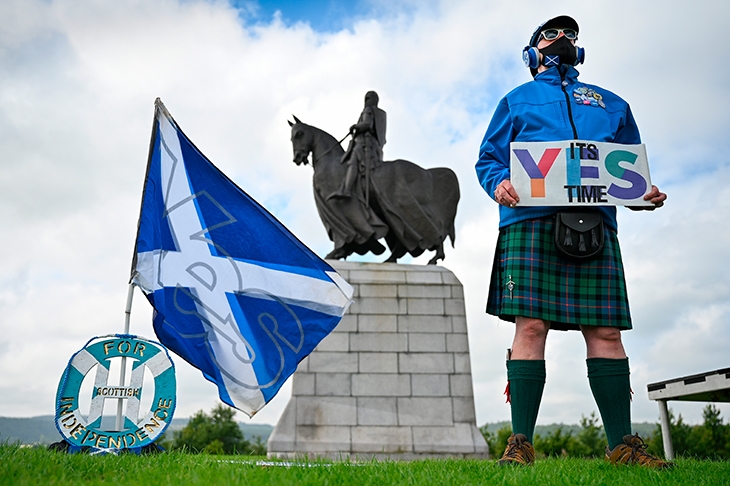Tony Blair’s biggest achievement was delivering a referendum that unified Scotland behind devolution and gave all parties a stake in its success. Boris Johnson is wrong to say it was ‘a disaster’, but in being wrong is helping precipitate the logical next step: independence. The opinion polls that show a growing majority for Scottish independence will mystify those who believe the lazy, metropolitan idea that independence is an emotional fantasy — all Braveheart, Bannockburn and bagpipes. How, they ask, could a band of Caledonian romantics ever convince the canny Scots to opt for such a thing?
But what if the case for independence was a highly sophisticated position advocated by one of the most popular political leaders in the world? It is now supported by 64 per cent of those aged under 65, according to one of the latest polls. The Spectator, while founded by a Scot, has never supported the idea of his homeland’s independence. But its readers rightly pride themselves on reading different points of view. I seek not your support but your understanding as I try to explain what is really going on here.
The problem for Scotland is that it cannot afford to remain on the UK’s glide path. Staying in the Union is riskier than independence. Voters can see that.
So why now? Brexit is the biggest part of the answer. Not just the fact of it but the manner of it. Brexit has become the emblem of a parting of perspective, outlook, ambition and values. Scottish voters want Scotland to return to Europe. It is true that Boris Johnson and his unpopularity in Scotland doesn’t help the Unionists’ case. But Scottish voters are not stupid and won’t make a permanent decision just to escape a prime minister whose premiership is as ‘deciduous as autumn leaves’. The issue is not him so much as the system that created him — and when he goes, as he will, that will remain.

Independence support is also emphatically not born of a chip on the shoulder towards England. If you don’t believe me, ponder this: in the 2014 referendum, a majority of people born in Scotland voted for independence. The ‘no’ vote was secured by the votes of people born elsewhere. Supporters of independence do not make anything of this, because they know that where people were born doesn’t matter. Scots look at Britain and see a country whose standing in the world is at its lowest ever ebb. They see, with Brexit, a regrettable desire to retreat from the world.
Every society now looks into the future, asking what to do after the pandemic ends. Which parliament would Scots choose to lead them through the great reform era that is upon us: Holyrood or Westminster? Which do they trust more on policies on the climate crisis, inequality and public finances? Which do you think?
In his outstanding book The Levelling: What’s Next After Globalisation, the Irish author Michael O’Sullivan points out that in 1924 Argentina was three times wealthier than Japan but is today half as rich. His point is that countries can make colossal strategic errors. The UK has been in a slow descent for some time now. It used to be the richest country on Earth, but currently sits in 21st position in the IMF rankings, and Brexit is hastening the drop. Why should Scotland now buckle in and continue to not enjoy the ride?
The problem for Scotland is that it cannot afford to remain on the UK’s glidepath
Unionists have long stopped arguing a positive case. Instead, they say, a different future for Scotland cannot be sought because of the starting point and the difficulties of the transition. Deficits, currency, borders: it all adds up to the same argument: ‘I wouldn’t start from here.’ So Scotland is stuck. This is a thin and vision-free case.
The SNP prospectus is worked out and clear on currency, public finances and how it would approach an agreement with the rest of the UK. It seeks an orderly transition that is stated in advance — the antithesis of Brexit. Scotland would retain sterling until preparations for a new currency are completed and tests are met ensuring that it is in Scotland’s interests. That will take time. Rome wasn’t built in a day, but it was worth building. A new central bank would be created immediately, serving similar functions to euro members’ central banks until the currency timing is right.
The UK economy is one of the most un-equal in the developed world. Every region outside the South East has large notional, and estimated, deficits — and Scotland’s is by no means the worst. The economic inequality that underpins them is the very reason to change, not to shore up the status quo. Levelling up? No, the Scots have higher ambitions.
The UK deficit this year, after Covid, will be more than twice what Scotland’s was last year and it is being funded at historically low rates of interest. Yet Scots are asked to believe that their deficit starting point would be unfundable. Clearly this is not true.
Furthermore, the Scottish government will seek to agree an Annual Solidarity Payment to the UK government to make good the agreed share of inherited debt interest payments and any joint work and projects that continue. How do you think that policy compares with the UK approach to Brexit?
Which brings me to the border: Scotland wants a frictionless one, yet Brexit imposes a new one to our east and west. We still — four years after the Brexit vote — await the detail on what it will mean.
What is so wrong, then, with the Scots — an identity of choice, not birth — wanting to have their own choices to determine who they are? They know it will take a huge effort. It will be hard work. But a growing majority believe it will be worth it.






Comments